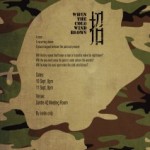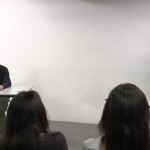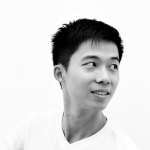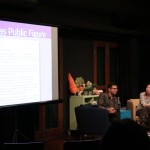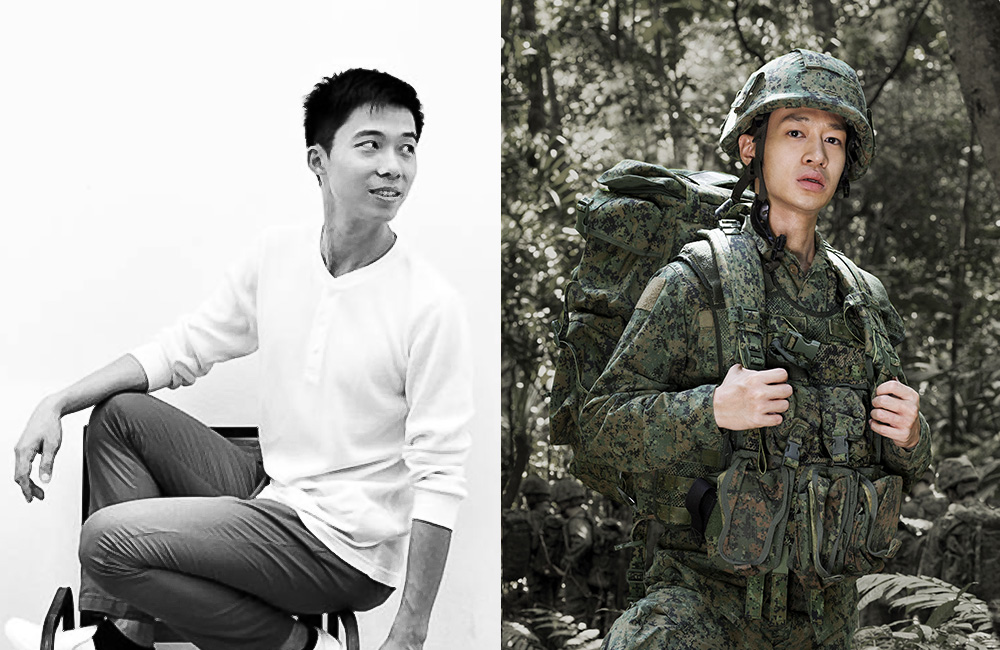
Left: Neo Hai Bin, playwright of “招: When the Cold Wind Blows”. Photo: Neo Hai Bin
Right: Publicity image of “招: When the Cold Wind Blows”. Photo: Wild Rice
It is a late Wednesday afternoon in May 2018, and Neo Hai Bin and I are sitting in a sun-drenched café in Chijmes. He is fair-skinned, slightly-built and mild-mannered. Sitting across from me with a toothy grin and hands lightly folded, I find it hard to believe he was once a fearsome Basic Military Training instructor barking at army recruits on Pulau Tekong. But that’s precisely what his Mandarin play 招: When the Cold Wind Blows is about.
In Cold Wind Blows, Xavier Ong is a man who completed his National Service ten years ago, but is still haunted by dreams of his time in the army, leaving him reeling over how he transformed from an anxious recruit to a cussing, steely Platoon Sergeant. The play will premiere at the Singapore Theatre Festival (STF) as part of a double-bill this coming July.
“[Cold Wind Blows] explores how human nature can be twisted under certain extreme circumstances or environments. And army is an extreme environment,” Hai Bin tells me. I ask what he means by an “extreme environment”, and he brings up the 1971 Stanford prison experiment as an example of how situations of highly unequal power relations can drastically alter human behaviour.
I’m heartened to hear Hai Bin speak about Cold Wind Blows with such clarity, because that hadn’t always been the case. As a documenter, I’ve been following the development of the work since January 2016, when Hai Bin and his collaborator Chong Woon Yong began their nine-month Basement Workshop residency at Centre 42.
Cold Wind Blows started out life as Project Men, in which Hai Bin and Woon Yong wanted explore the concept of masculinity through the lens of National Service. Like Hai Bin, Woon Yong had been a commander at the Basic Military Training Centre on Pulau Tekong.
Besides drawing from their own memories and experiences, the playwrights also talked to other Singaporean men about their time in the army, and looked at news reports and forum pages on National Service and Pulau Tekong. I recall the playwrights struggling with the stacks of research and writing they had amassed.
“I think at the start, I think we weren’t super clear on our reasons for doing this,” quipped Woon Yong in my first interview with them four months into the project. “It was like swimming through mud.”
More pertinently, Hai Bin and Woon Yong wrestled with whether they were even the right people to say something about National Service. Hai Bin candidly shared, “We are Chinese. That in itself is a privilege already. We [were] commanders – another privilege. We speak English – another privilege. We have ‘A’ Levels – another privilege. We have nothing to talk about. We have no issues. What kind of issues are there? 要做什么 [What to do]?”
The pair worked steadily and shared a first draft of their play at a private reading on 21 May 2016. Industry peers who were invited to the reading included playwright Jean Tay, directors Nelson Chia and Liu Xiaoyi, as well as Thong Pei Qin, who was asked to direct Cold Wind Blows in 2018.
“The session was good,” Hai Bin told me after the reading. “This group of people [helped us] clarify what was lacking in this draft and what was lacking in our ideas.”
Hai Bin and Woon Yong continued working on the script and prepared for an off-book showcase of the work under a new title, 招: When the Cold Wind Blows, after a popular song sung by marching troops in the army. They performed the 40-minute play for small groups of invited audience members in the Centre 42 Meeting Room on 10 and 11 September 2016.
The first inclination that Cold Wind Blows was reaching beyond the gendered confines of the project was when female audience members responded favourably to the work during the showcase.
“I was very moved by what was happening to [Xavier], so it wasn’t a problem that I had no concept of what National Service is,” a female theatre practitioner commented after the performance. “I think everybody can relate to that idea of enforced discipline. We’ve all gone through it at some point in school, maybe not to that level, but you can sort of get the idea of the bullying and the sort of power that can corrupt.”
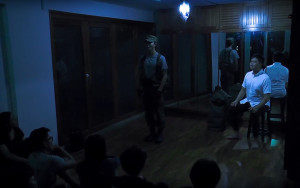
“招: When the Cold Wind Blows” performed on 10 Sep 2016. Performed by Neo Hai Bin (left) and Chong Woon Yong (right). (Photo: Screengrab from Centre 42 video documentation.)
However, at the end of nine intensive months of work, the playwrights had had enough of the play.
“A bit jelak [Malay for “cloying”], a bit too close,” Woon Yong said in my final interview with them in the Basement Workshop. “Maybe we will let it rest a while, and then we will come back again.”
“There has to be changes made to the script,” Hai Bin said pragmatically.
In 2017, Wild Rice resident playwright Alfian Sa’at was on the lookout for new scripts for the Singapore Theatre Festival (STF) in 2018, and Centre 42 recommended Cold Wind Blows. Alfian got in touch with the playwrights to find out more about the work.
“I liked the script,” Alfian replies when I ask why he had selected Cold Wind Blows for the festival. I press for him to elaborate.
“I am drawn towards playwrights who have a concern about the society they live in. In Cold Wind Blows, it’s someone who’s trying to examine the experience of National Service that is really quite different from what I think I’ve seen before, which happened to be very often quite celebratory, [works like] Army Daze [a play and film by Michael Chiang] and, of course, the Jack Neo film series [Ah Boys to Men].”
Hai Bin decided to continue working on the script, while Wong Yong chose instead to focus on G.F.E., his play that will accompany Cold Wind Blows in the STF double-bill. With dramaturgical advice from Alfian, Hai Bin revised the script and added over 15 minutes’ worth of material. The cast and creative team were assembled in late 2017. When I meet Hai Bin at Chijmes in May 2018, rehearsals for Cold Wind Blows have just begun.
The long journey to see Cold Wind Blows on stage is about to end. Although it’s been almost 30 months since the work was first conceived, Hai Bin still has the same concerns about the androcentric play. Except this time, he has an answer.
“I have to admit that for this play the playwrights are men. The characters are men. National service is for men,” Hai Bin says to me. “But now, the play is more than about men.”
Far more than witnessing the creation of a new work, I’ve also seen Hai Bin grow as a playwright. Asking him how working on Cold Wind Blows has influenced his play-writing, he credits the experience with helping him write his most recent play Cut Kafka!, a cross-disciplinary work based on the writings of Franz Kafka that was staged in March this year.
He says, “As a new playwright, you don’t have a methodology. When you don’t have a methodology, then everything is a possibility. Then you get confused. And you’ll want to tear your hair out!
“Now, I have a clearer idea of what sort of person I am and what I want to write. It gets easier.”
By Daniel Teo
Published on 6 July 2018
招: When the Cold Wind Blows runs at the Singapore Theatre Festival from 12 to 15 July 2018 at Creative Cube, LASALLE College of the Arts. Tickets can be purchased here.
To see the development of Cold Wind Blows in video interviews and writings, check out our Basement Workshop page.

